Report on Employee Motivation, Factors & Job Role Experiences
VerifiedAdded on 2023/06/05
|8
|1889
|228
Report
AI Summary
This report delves into the multifaceted reasons why individuals engage in work, emphasizing its role in financial independence, personal identity, and social bonding. It identifies various motivational factors, including leadership styles, positive company culture, job advancement opportunities, open communication, job security, recognition, flexibility, financial benefits, and pride. The report further explores the positive and negative factors employees encounter in their job roles, such as work environment, promotion opportunities, safety and security, authority and responsibilities, respect, flexibility, feedback, and fair policies. Ultimately, the report concludes that a combination of these factors significantly impacts employee performance, job satisfaction, and overall well-being, highlighting the importance of fostering a supportive and motivating work environment. Desklib provides access to this report along with numerous other solved assignments.
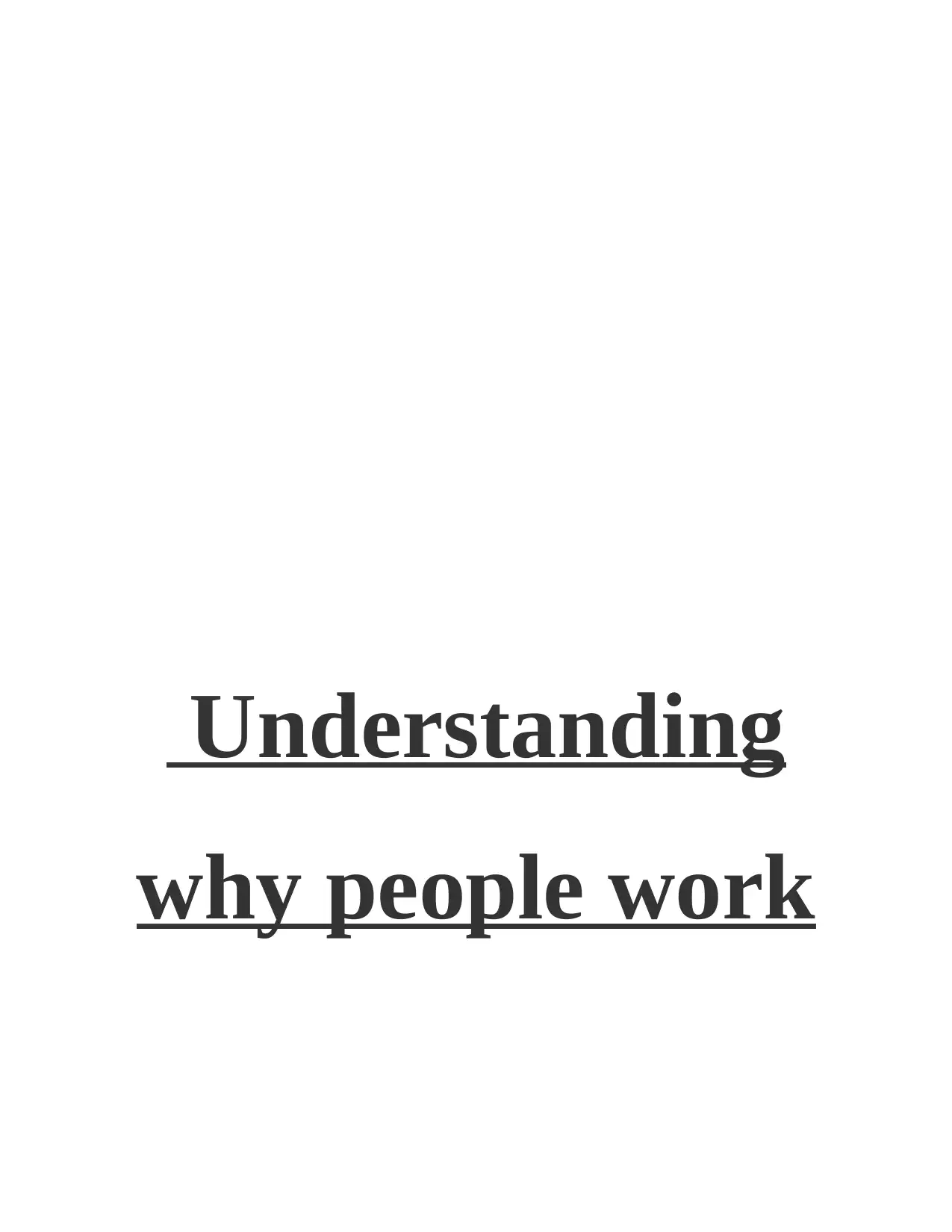
Understanding
why people work
why people work
Paraphrase This Document
Need a fresh take? Get an instant paraphrase of this document with our AI Paraphraser
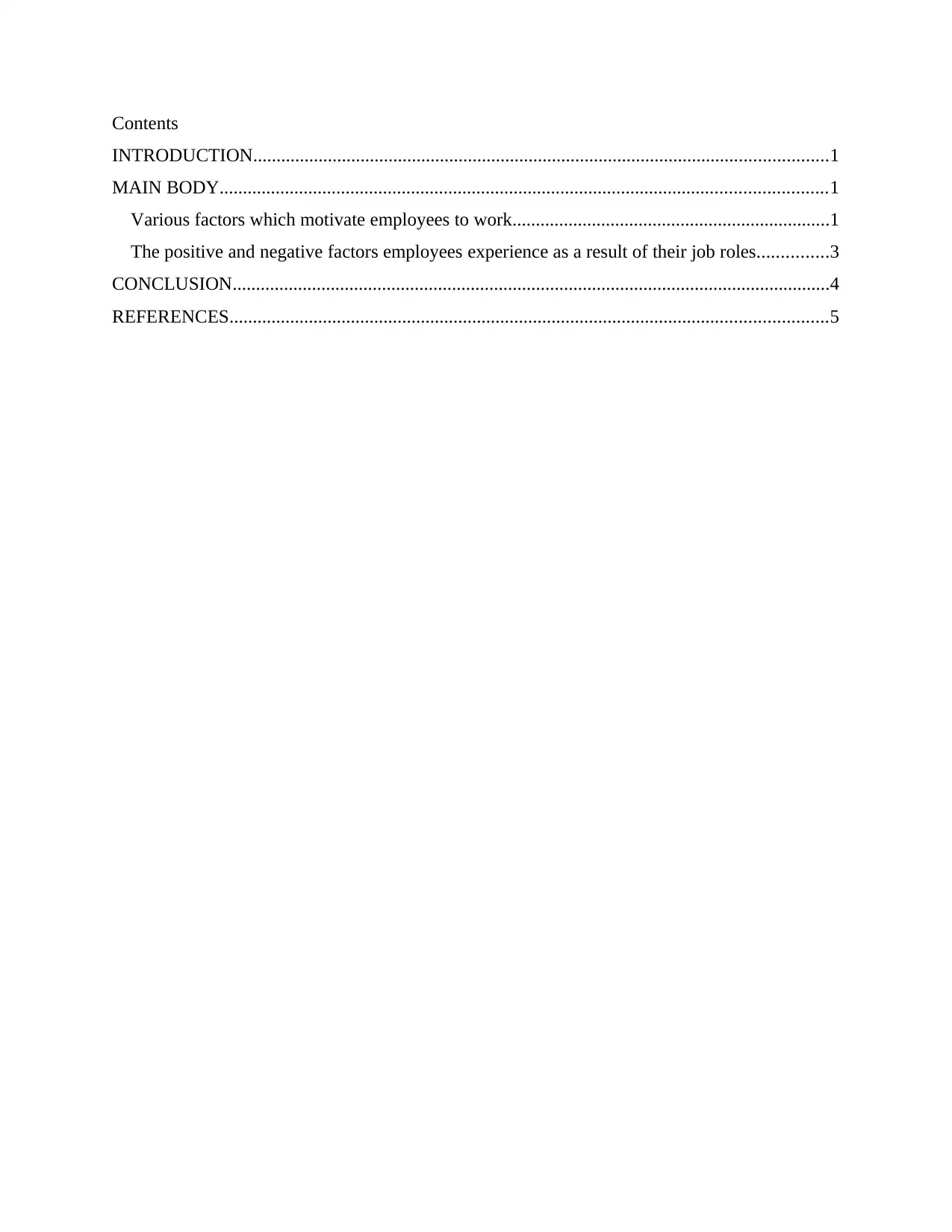
Contents
INTRODUCTION...........................................................................................................................1
MAIN BODY..................................................................................................................................1
Various factors which motivate employees to work....................................................................1
The positive and negative factors employees experience as a result of their job roles...............3
CONCLUSION................................................................................................................................4
REFERENCES................................................................................................................................5
INTRODUCTION...........................................................................................................................1
MAIN BODY..................................................................................................................................1
Various factors which motivate employees to work....................................................................1
The positive and negative factors employees experience as a result of their job roles...............3
CONCLUSION................................................................................................................................4
REFERENCES................................................................................................................................5
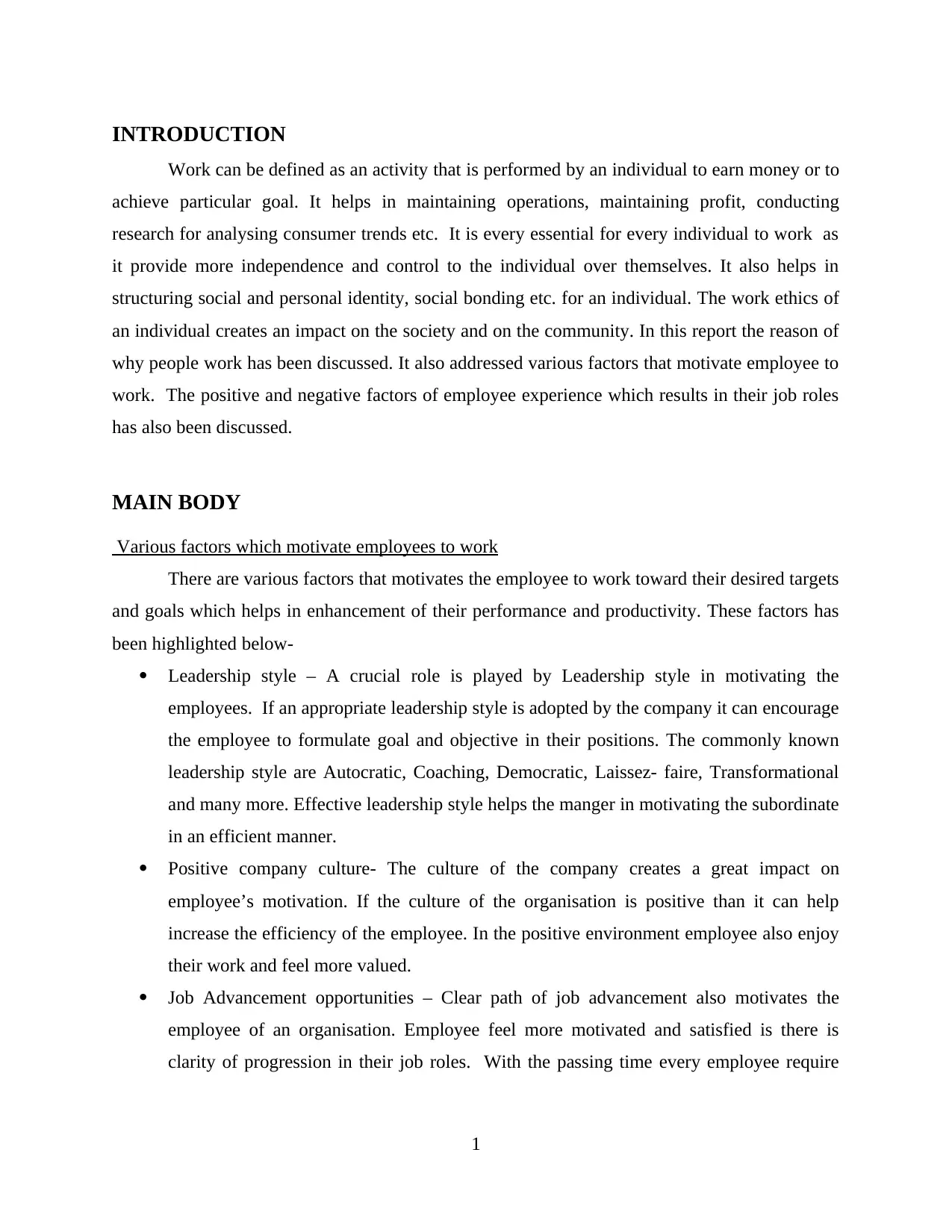
INTRODUCTION
Work can be defined as an activity that is performed by an individual to earn money or to
achieve particular goal. It helps in maintaining operations, maintaining profit, conducting
research for analysing consumer trends etc. It is every essential for every individual to work as
it provide more independence and control to the individual over themselves. It also helps in
structuring social and personal identity, social bonding etc. for an individual. The work ethics of
an individual creates an impact on the society and on the community. In this report the reason of
why people work has been discussed. It also addressed various factors that motivate employee to
work. The positive and negative factors of employee experience which results in their job roles
has also been discussed.
MAIN BODY
Various factors which motivate employees to work
There are various factors that motivates the employee to work toward their desired targets
and goals which helps in enhancement of their performance and productivity. These factors has
been highlighted below-
Leadership style – A crucial role is played by Leadership style in motivating the
employees. If an appropriate leadership style is adopted by the company it can encourage
the employee to formulate goal and objective in their positions. The commonly known
leadership style are Autocratic, Coaching, Democratic, Laissez- faire, Transformational
and many more. Effective leadership style helps the manger in motivating the subordinate
in an efficient manner.
Positive company culture- The culture of the company creates a great impact on
employee’s motivation. If the culture of the organisation is positive than it can help
increase the efficiency of the employee. In the positive environment employee also enjoy
their work and feel more valued.
Job Advancement opportunities – Clear path of job advancement also motivates the
employee of an organisation. Employee feel more motivated and satisfied is there is
clarity of progression in their job roles. With the passing time every employee require
1
Work can be defined as an activity that is performed by an individual to earn money or to
achieve particular goal. It helps in maintaining operations, maintaining profit, conducting
research for analysing consumer trends etc. It is every essential for every individual to work as
it provide more independence and control to the individual over themselves. It also helps in
structuring social and personal identity, social bonding etc. for an individual. The work ethics of
an individual creates an impact on the society and on the community. In this report the reason of
why people work has been discussed. It also addressed various factors that motivate employee to
work. The positive and negative factors of employee experience which results in their job roles
has also been discussed.
MAIN BODY
Various factors which motivate employees to work
There are various factors that motivates the employee to work toward their desired targets
and goals which helps in enhancement of their performance and productivity. These factors has
been highlighted below-
Leadership style – A crucial role is played by Leadership style in motivating the
employees. If an appropriate leadership style is adopted by the company it can encourage
the employee to formulate goal and objective in their positions. The commonly known
leadership style are Autocratic, Coaching, Democratic, Laissez- faire, Transformational
and many more. Effective leadership style helps the manger in motivating the subordinate
in an efficient manner.
Positive company culture- The culture of the company creates a great impact on
employee’s motivation. If the culture of the organisation is positive than it can help
increase the efficiency of the employee. In the positive environment employee also enjoy
their work and feel more valued.
Job Advancement opportunities – Clear path of job advancement also motivates the
employee of an organisation. Employee feel more motivated and satisfied is there is
clarity of progression in their job roles. With the passing time every employee require
1
⊘ This is a preview!⊘
Do you want full access?
Subscribe today to unlock all pages.

Trusted by 1+ million students worldwide
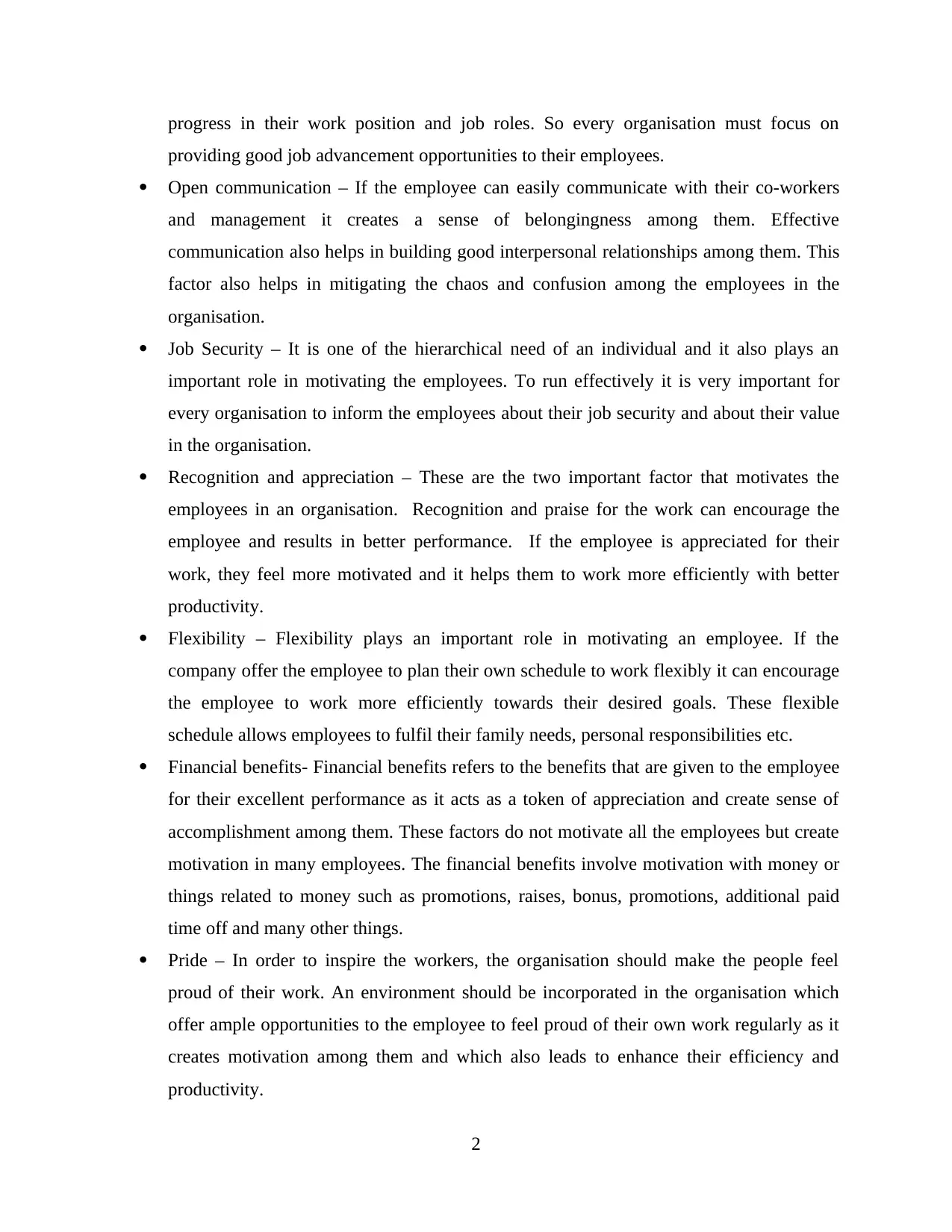
progress in their work position and job roles. So every organisation must focus on
providing good job advancement opportunities to their employees.
Open communication – If the employee can easily communicate with their co-workers
and management it creates a sense of belongingness among them. Effective
communication also helps in building good interpersonal relationships among them. This
factor also helps in mitigating the chaos and confusion among the employees in the
organisation.
Job Security – It is one of the hierarchical need of an individual and it also plays an
important role in motivating the employees. To run effectively it is very important for
every organisation to inform the employees about their job security and about their value
in the organisation.
Recognition and appreciation – These are the two important factor that motivates the
employees in an organisation. Recognition and praise for the work can encourage the
employee and results in better performance. If the employee is appreciated for their
work, they feel more motivated and it helps them to work more efficiently with better
productivity.
Flexibility – Flexibility plays an important role in motivating an employee. If the
company offer the employee to plan their own schedule to work flexibly it can encourage
the employee to work more efficiently towards their desired goals. These flexible
schedule allows employees to fulfil their family needs, personal responsibilities etc.
Financial benefits- Financial benefits refers to the benefits that are given to the employee
for their excellent performance as it acts as a token of appreciation and create sense of
accomplishment among them. These factors do not motivate all the employees but create
motivation in many employees. The financial benefits involve motivation with money or
things related to money such as promotions, raises, bonus, promotions, additional paid
time off and many other things.
Pride – In order to inspire the workers, the organisation should make the people feel
proud of their work. An environment should be incorporated in the organisation which
offer ample opportunities to the employee to feel proud of their own work regularly as it
creates motivation among them and which also leads to enhance their efficiency and
productivity.
2
providing good job advancement opportunities to their employees.
Open communication – If the employee can easily communicate with their co-workers
and management it creates a sense of belongingness among them. Effective
communication also helps in building good interpersonal relationships among them. This
factor also helps in mitigating the chaos and confusion among the employees in the
organisation.
Job Security – It is one of the hierarchical need of an individual and it also plays an
important role in motivating the employees. To run effectively it is very important for
every organisation to inform the employees about their job security and about their value
in the organisation.
Recognition and appreciation – These are the two important factor that motivates the
employees in an organisation. Recognition and praise for the work can encourage the
employee and results in better performance. If the employee is appreciated for their
work, they feel more motivated and it helps them to work more efficiently with better
productivity.
Flexibility – Flexibility plays an important role in motivating an employee. If the
company offer the employee to plan their own schedule to work flexibly it can encourage
the employee to work more efficiently towards their desired goals. These flexible
schedule allows employees to fulfil their family needs, personal responsibilities etc.
Financial benefits- Financial benefits refers to the benefits that are given to the employee
for their excellent performance as it acts as a token of appreciation and create sense of
accomplishment among them. These factors do not motivate all the employees but create
motivation in many employees. The financial benefits involve motivation with money or
things related to money such as promotions, raises, bonus, promotions, additional paid
time off and many other things.
Pride – In order to inspire the workers, the organisation should make the people feel
proud of their work. An environment should be incorporated in the organisation which
offer ample opportunities to the employee to feel proud of their own work regularly as it
creates motivation among them and which also leads to enhance their efficiency and
productivity.
2
Paraphrase This Document
Need a fresh take? Get an instant paraphrase of this document with our AI Paraphraser
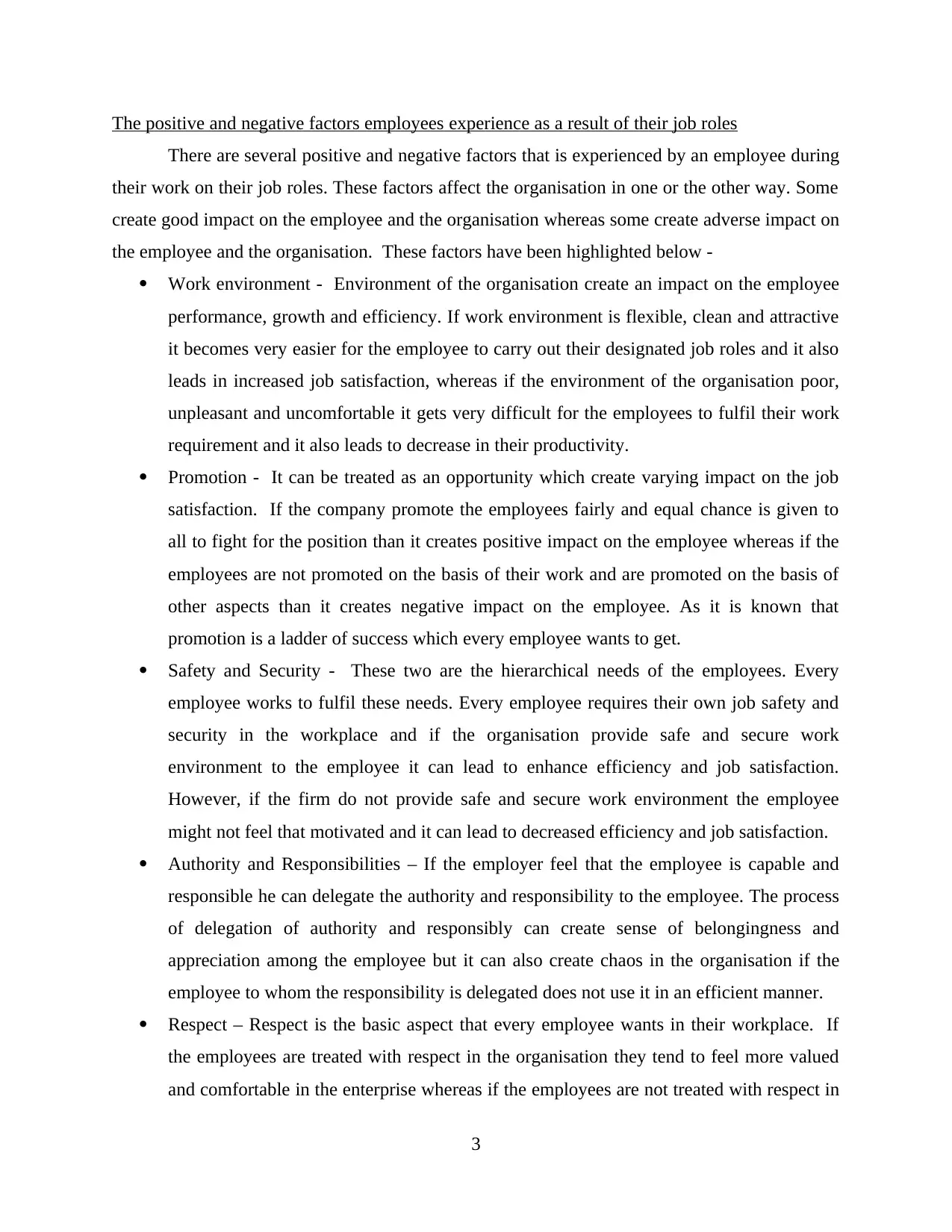
The positive and negative factors employees experience as a result of their job roles
There are several positive and negative factors that is experienced by an employee during
their work on their job roles. These factors affect the organisation in one or the other way. Some
create good impact on the employee and the organisation whereas some create adverse impact on
the employee and the organisation. These factors have been highlighted below -
Work environment - Environment of the organisation create an impact on the employee
performance, growth and efficiency. If work environment is flexible, clean and attractive
it becomes very easier for the employee to carry out their designated job roles and it also
leads in increased job satisfaction, whereas if the environment of the organisation poor,
unpleasant and uncomfortable it gets very difficult for the employees to fulfil their work
requirement and it also leads to decrease in their productivity.
Promotion - It can be treated as an opportunity which create varying impact on the job
satisfaction. If the company promote the employees fairly and equal chance is given to
all to fight for the position than it creates positive impact on the employee whereas if the
employees are not promoted on the basis of their work and are promoted on the basis of
other aspects than it creates negative impact on the employee. As it is known that
promotion is a ladder of success which every employee wants to get.
Safety and Security - These two are the hierarchical needs of the employees. Every
employee works to fulfil these needs. Every employee requires their own job safety and
security in the workplace and if the organisation provide safe and secure work
environment to the employee it can lead to enhance efficiency and job satisfaction.
However, if the firm do not provide safe and secure work environment the employee
might not feel that motivated and it can lead to decreased efficiency and job satisfaction.
Authority and Responsibilities – If the employer feel that the employee is capable and
responsible he can delegate the authority and responsibility to the employee. The process
of delegation of authority and responsibly can create sense of belongingness and
appreciation among the employee but it can also create chaos in the organisation if the
employee to whom the responsibility is delegated does not use it in an efficient manner.
Respect – Respect is the basic aspect that every employee wants in their workplace. If
the employees are treated with respect in the organisation they tend to feel more valued
and comfortable in the enterprise whereas if the employees are not treated with respect in
3
There are several positive and negative factors that is experienced by an employee during
their work on their job roles. These factors affect the organisation in one or the other way. Some
create good impact on the employee and the organisation whereas some create adverse impact on
the employee and the organisation. These factors have been highlighted below -
Work environment - Environment of the organisation create an impact on the employee
performance, growth and efficiency. If work environment is flexible, clean and attractive
it becomes very easier for the employee to carry out their designated job roles and it also
leads in increased job satisfaction, whereas if the environment of the organisation poor,
unpleasant and uncomfortable it gets very difficult for the employees to fulfil their work
requirement and it also leads to decrease in their productivity.
Promotion - It can be treated as an opportunity which create varying impact on the job
satisfaction. If the company promote the employees fairly and equal chance is given to
all to fight for the position than it creates positive impact on the employee whereas if the
employees are not promoted on the basis of their work and are promoted on the basis of
other aspects than it creates negative impact on the employee. As it is known that
promotion is a ladder of success which every employee wants to get.
Safety and Security - These two are the hierarchical needs of the employees. Every
employee works to fulfil these needs. Every employee requires their own job safety and
security in the workplace and if the organisation provide safe and secure work
environment to the employee it can lead to enhance efficiency and job satisfaction.
However, if the firm do not provide safe and secure work environment the employee
might not feel that motivated and it can lead to decreased efficiency and job satisfaction.
Authority and Responsibilities – If the employer feel that the employee is capable and
responsible he can delegate the authority and responsibility to the employee. The process
of delegation of authority and responsibly can create sense of belongingness and
appreciation among the employee but it can also create chaos in the organisation if the
employee to whom the responsibility is delegated does not use it in an efficient manner.
Respect – Respect is the basic aspect that every employee wants in their workplace. If
the employees are treated with respect in the organisation they tend to feel more valued
and comfortable in the enterprise whereas if the employees are not treated with respect in
3
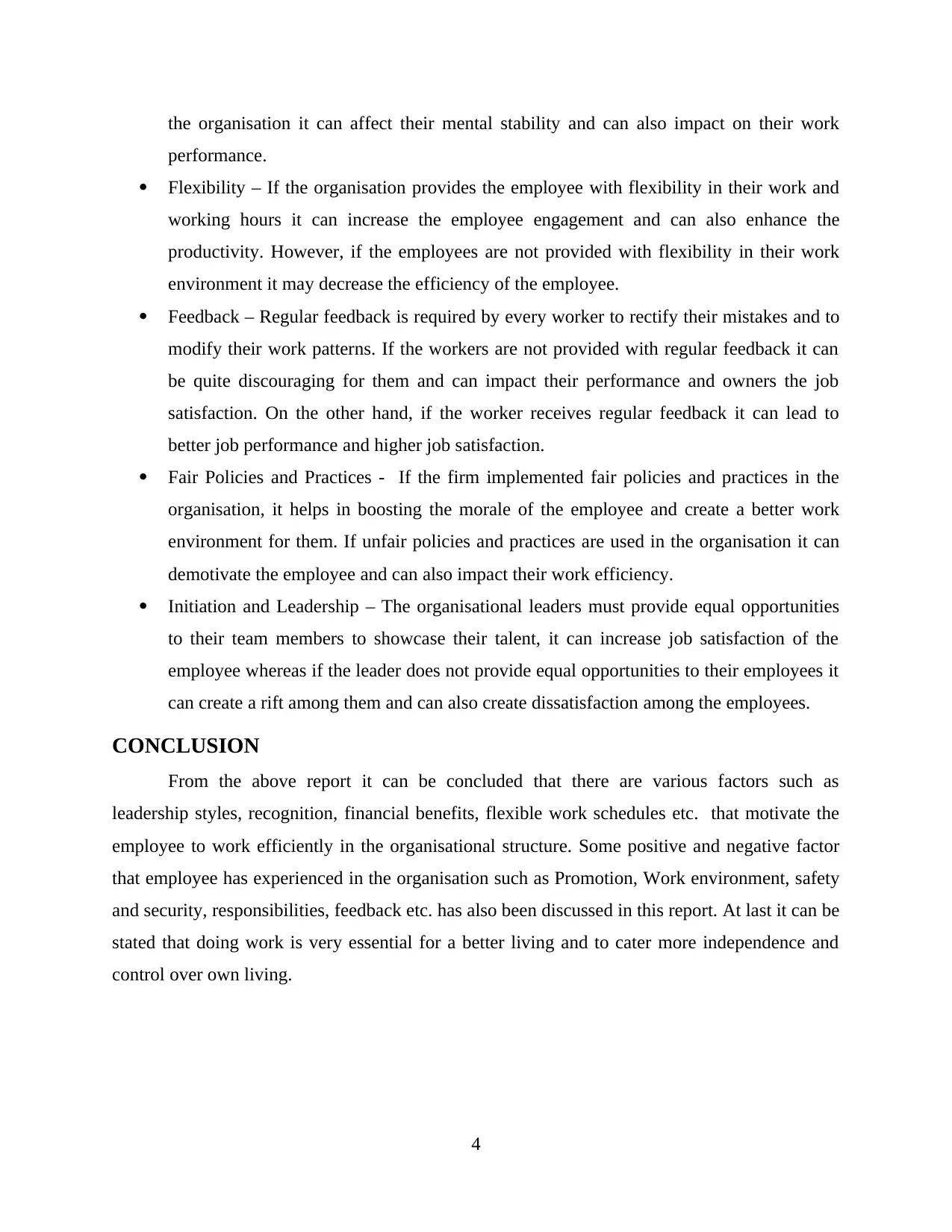
the organisation it can affect their mental stability and can also impact on their work
performance.
Flexibility – If the organisation provides the employee with flexibility in their work and
working hours it can increase the employee engagement and can also enhance the
productivity. However, if the employees are not provided with flexibility in their work
environment it may decrease the efficiency of the employee.
Feedback – Regular feedback is required by every worker to rectify their mistakes and to
modify their work patterns. If the workers are not provided with regular feedback it can
be quite discouraging for them and can impact their performance and owners the job
satisfaction. On the other hand, if the worker receives regular feedback it can lead to
better job performance and higher job satisfaction.
Fair Policies and Practices - If the firm implemented fair policies and practices in the
organisation, it helps in boosting the morale of the employee and create a better work
environment for them. If unfair policies and practices are used in the organisation it can
demotivate the employee and can also impact their work efficiency.
Initiation and Leadership – The organisational leaders must provide equal opportunities
to their team members to showcase their talent, it can increase job satisfaction of the
employee whereas if the leader does not provide equal opportunities to their employees it
can create a rift among them and can also create dissatisfaction among the employees.
CONCLUSION
From the above report it can be concluded that there are various factors such as
leadership styles, recognition, financial benefits, flexible work schedules etc. that motivate the
employee to work efficiently in the organisational structure. Some positive and negative factor
that employee has experienced in the organisation such as Promotion, Work environment, safety
and security, responsibilities, feedback etc. has also been discussed in this report. At last it can be
stated that doing work is very essential for a better living and to cater more independence and
control over own living.
4
performance.
Flexibility – If the organisation provides the employee with flexibility in their work and
working hours it can increase the employee engagement and can also enhance the
productivity. However, if the employees are not provided with flexibility in their work
environment it may decrease the efficiency of the employee.
Feedback – Regular feedback is required by every worker to rectify their mistakes and to
modify their work patterns. If the workers are not provided with regular feedback it can
be quite discouraging for them and can impact their performance and owners the job
satisfaction. On the other hand, if the worker receives regular feedback it can lead to
better job performance and higher job satisfaction.
Fair Policies and Practices - If the firm implemented fair policies and practices in the
organisation, it helps in boosting the morale of the employee and create a better work
environment for them. If unfair policies and practices are used in the organisation it can
demotivate the employee and can also impact their work efficiency.
Initiation and Leadership – The organisational leaders must provide equal opportunities
to their team members to showcase their talent, it can increase job satisfaction of the
employee whereas if the leader does not provide equal opportunities to their employees it
can create a rift among them and can also create dissatisfaction among the employees.
CONCLUSION
From the above report it can be concluded that there are various factors such as
leadership styles, recognition, financial benefits, flexible work schedules etc. that motivate the
employee to work efficiently in the organisational structure. Some positive and negative factor
that employee has experienced in the organisation such as Promotion, Work environment, safety
and security, responsibilities, feedback etc. has also been discussed in this report. At last it can be
stated that doing work is very essential for a better living and to cater more independence and
control over own living.
4
⊘ This is a preview!⊘
Do you want full access?
Subscribe today to unlock all pages.

Trusted by 1+ million students worldwide

REFERENCES
Books and Journals:
5
Books and Journals:
5
Paraphrase This Document
Need a fresh take? Get an instant paraphrase of this document with our AI Paraphraser
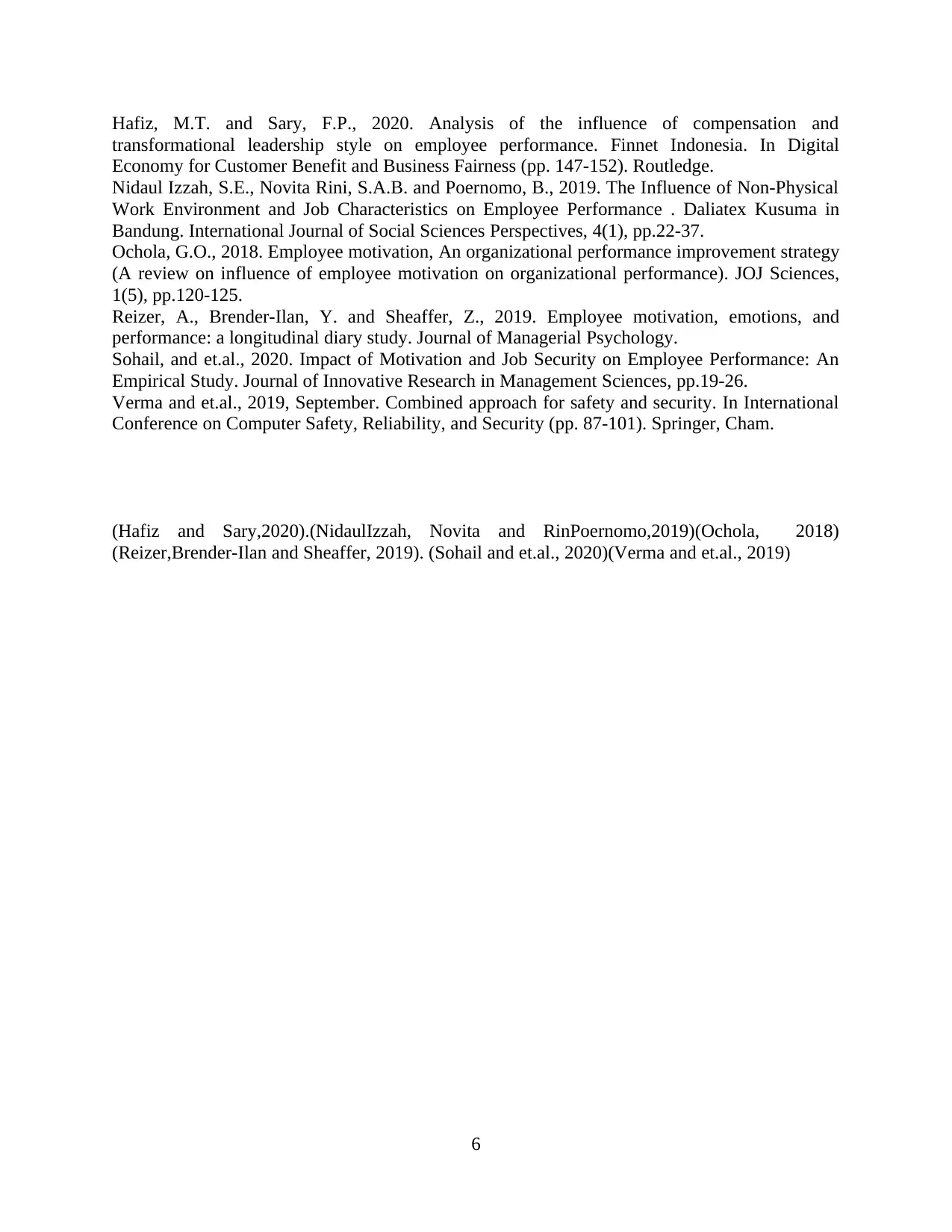
Hafiz, M.T. and Sary, F.P., 2020. Analysis of the influence of compensation and
transformational leadership style on employee performance. Finnet Indonesia. In Digital
Economy for Customer Benefit and Business Fairness (pp. 147-152). Routledge.
Nidaul Izzah, S.E., Novita Rini, S.A.B. and Poernomo, B., 2019. The Influence of Non-Physical
Work Environment and Job Characteristics on Employee Performance . Daliatex Kusuma in
Bandung. International Journal of Social Sciences Perspectives, 4(1), pp.22-37.
Ochola, G.O., 2018. Employee motivation, An organizational performance improvement strategy
(A review on influence of employee motivation on organizational performance). JOJ Sciences,
1(5), pp.120-125.
Reizer, A., Brender-Ilan, Y. and Sheaffer, Z., 2019. Employee motivation, emotions, and
performance: a longitudinal diary study. Journal of Managerial Psychology.
Sohail, and et.al., 2020. Impact of Motivation and Job Security on Employee Performance: An
Empirical Study. Journal of Innovative Research in Management Sciences, pp.19-26.
Verma and et.al., 2019, September. Combined approach for safety and security. In International
Conference on Computer Safety, Reliability, and Security (pp. 87-101). Springer, Cham.
(Hafiz and Sary,2020).(NidaulIzzah, Novita and RinPoernomo,2019)(Ochola, 2018)
(Reizer,Brender-Ilan and Sheaffer, 2019). (Sohail and et.al., 2020)(Verma and et.al., 2019)
6
transformational leadership style on employee performance. Finnet Indonesia. In Digital
Economy for Customer Benefit and Business Fairness (pp. 147-152). Routledge.
Nidaul Izzah, S.E., Novita Rini, S.A.B. and Poernomo, B., 2019. The Influence of Non-Physical
Work Environment and Job Characteristics on Employee Performance . Daliatex Kusuma in
Bandung. International Journal of Social Sciences Perspectives, 4(1), pp.22-37.
Ochola, G.O., 2018. Employee motivation, An organizational performance improvement strategy
(A review on influence of employee motivation on organizational performance). JOJ Sciences,
1(5), pp.120-125.
Reizer, A., Brender-Ilan, Y. and Sheaffer, Z., 2019. Employee motivation, emotions, and
performance: a longitudinal diary study. Journal of Managerial Psychology.
Sohail, and et.al., 2020. Impact of Motivation and Job Security on Employee Performance: An
Empirical Study. Journal of Innovative Research in Management Sciences, pp.19-26.
Verma and et.al., 2019, September. Combined approach for safety and security. In International
Conference on Computer Safety, Reliability, and Security (pp. 87-101). Springer, Cham.
(Hafiz and Sary,2020).(NidaulIzzah, Novita and RinPoernomo,2019)(Ochola, 2018)
(Reizer,Brender-Ilan and Sheaffer, 2019). (Sohail and et.al., 2020)(Verma and et.al., 2019)
6
1 out of 8
Related Documents
Your All-in-One AI-Powered Toolkit for Academic Success.
+13062052269
info@desklib.com
Available 24*7 on WhatsApp / Email
![[object Object]](/_next/static/media/star-bottom.7253800d.svg)
Unlock your academic potential
Copyright © 2020–2026 A2Z Services. All Rights Reserved. Developed and managed by ZUCOL.



